Neomieweru
On this page, you find all documents, package deals, and flashcards offered by seller neomieweru.
- 442
- 0
- 4
Community
- Followers
- Following
446 items
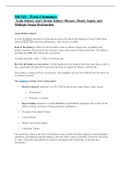
NR 341: Week 4 Summary Acute Kidney and Chronic Kidney Disease; Shock, Sepsis, and Multiple Organ Dysfunction
NR 341: Week 4 Summary Acute Kidney and Chronic Kidney Disease; Shock, Sepsis, and Multiple Organ Dysfunction Acute Kidney Injury: It is the SUDDEN decrease in renal function that will lead to the buildup of waste in the blood, fluid overload, and electrolyte imbalances. AKI can be reversible. Role of the kidneys: Filters the blood which creates a filtrate called urine. In addition, the kidneys regulate electrolyte levels, removes waste, and excessive fluid in the body. The kidneys norma...
- Exam (elaborations)
- • 14 pages •
NR 341: Week 4 Summary Acute Kidney and Chronic Kidney Disease; Shock, Sepsis, and Multiple Organ Dysfunction Acute Kidney Injury: It is the SUDDEN decrease in renal function that will lead to the buildup of waste in the blood, fluid overload, and electrolyte imbalances. AKI can be reversible. Role of the kidneys: Filters the blood which creates a filtrate called urine. In addition, the kidneys regulate electrolyte levels, removes waste, and excessive fluid in the body. The kidneys norma...
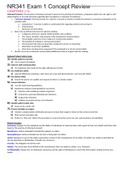
NR 341 CHAPTERS 1-5:
CHAPTERS 1-5: Informed Consent: The doctrine of informed consent is based on the principle of autonomy; competent adults have the right to self-determination or to make decisions regarding their acceptance or rejection of treatment. 1. 3 primary elements: Must be present for a person’s consent or decline of medical treatment or research participation to be consider valid. a. Competence = A person’s ability to understand info regarding medical and nursing Tx. b. Voluntariness c. Discl...
- Exam (elaborations)
- • 15 pages •
CHAPTERS 1-5: Informed Consent: The doctrine of informed consent is based on the principle of autonomy; competent adults have the right to self-determination or to make decisions regarding their acceptance or rejection of treatment. 1. 3 primary elements: Must be present for a person’s consent or decline of medical treatment or research participation to be consider valid. a. Competence = A person’s ability to understand info regarding medical and nursing Tx. b. Voluntariness c. Discl...
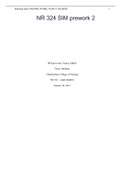
NR 324 SIM prework 2
NR 324 SIM prework 2 SIM pre-work, Nancy Gilbert Tania Abraham Chamberlain College of Nursing NR 324 – Adult Health I January 24, 2017 How can a patient and nurse effectively interact and communicate when that patient has a tracheostomy? Communication is important for a tracheostomy patient. Most patients with a tracheostomy won’t be able to speak. Before a patient get a tracheostomy, patient should be taught about non-verbal communications. Patient ca...
- Exam (elaborations)
- • 3 pages •
NR 324 SIM prework 2 SIM pre-work, Nancy Gilbert Tania Abraham Chamberlain College of Nursing NR 324 – Adult Health I January 24, 2017 How can a patient and nurse effectively interact and communicate when that patient has a tracheostomy? Communication is important for a tracheostomy patient. Most patients with a tracheostomy won’t be able to speak. Before a patient get a tracheostomy, patient should be taught about non-verbal communications. Patient ca...
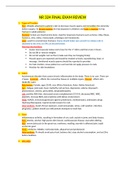
NR 324 FINAL EXAM REVIEW
NR 324 FINAL EXAM REVIEW 1. Types of Traction Skin: Weights attached to patient’s skin to decrease muscle spams and immobilize the extremity before surgery. Ex Bryant traction (for hip dysplasia in children) and Buck ‘s traction for hip fracture in adult patients). Skeletal: Screws are inserted into bone. Used for long bone fractures such as femur, tibia, fibula, humerus, ulna, radius, metacarpals, phalanges and metatarsals. Halo: used for cervical bone fractures. Nurse should make sure ...
- Exam (elaborations)
- • 7 pages •
NR 324 FINAL EXAM REVIEW 1. Types of Traction Skin: Weights attached to patient’s skin to decrease muscle spams and immobilize the extremity before surgery. Ex Bryant traction (for hip dysplasia in children) and Buck ‘s traction for hip fracture in adult patients). Skeletal: Screws are inserted into bone. Used for long bone fractures such as femur, tibia, fibula, humerus, ulna, radius, metacarpals, phalanges and metatarsals. Halo: used for cervical bone fractures. Nurse should make sure ...
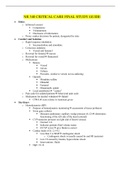
NR 340 CRITICAL CARE FINAL STUDY GUIDE
NR 340 CRITICAL CARE FINAL STUDY GUIDE • Ethics o Informed consent Competence Voluntariness Disclosure of information o Proxy- makes decisions for patient, designated by state • Comfort and Sedation o Rapid sequence intubation Succinocholine and etomidate o Conscious sedations Versed and fentanyl o Reversal for fentanyl narcan o Reversal for versed flumazenil o Medications Benzos • Versed • Ativan • Valium • Precedex- similar to ver...
- Exam (elaborations)
- • 14 pages •
NR 340 CRITICAL CARE FINAL STUDY GUIDE • Ethics o Informed consent Competence Voluntariness Disclosure of information o Proxy- makes decisions for patient, designated by state • Comfort and Sedation o Rapid sequence intubation Succinocholine and etomidate o Conscious sedations Versed and fentanyl o Reversal for fentanyl narcan o Reversal for versed flumazenil o Medications Benzos • Versed • Ativan • Valium • Precedex- similar to ver...
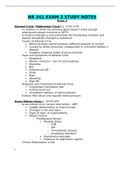
NR 341 EXAM 3 STUDY NOTES Exam 3
NR 341 EXAM 3 STUDY NOTES Exam 3 Adrenal Crisis “Addisonian Crisis” p. 1178-1179 - A condition in which the pituitary gland doesn’t make enough adrenocorticotropic hormone or ACTH - A medical emergency and potentially life-threatening situation and require immediate emergency treatment - Causes of Adrenal Crisis • When the body cannot produce sufficient amounts of cortisol • Caused by either previously undiagnosed or untreated Addison’s disease • Suddenly stopping inta...
- Exam (elaborations)
- • 44 pages •
NR 341 EXAM 3 STUDY NOTES Exam 3 Adrenal Crisis “Addisonian Crisis” p. 1178-1179 - A condition in which the pituitary gland doesn’t make enough adrenocorticotropic hormone or ACTH - A medical emergency and potentially life-threatening situation and require immediate emergency treatment - Causes of Adrenal Crisis • When the body cannot produce sufficient amounts of cortisol • Caused by either previously undiagnosed or untreated Addison’s disease • Suddenly stopping inta...
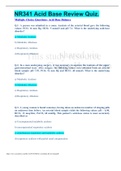
NR341 Acid Base Review Quiz.
NR341 Acid Base Review Quiz. Multiple Choice Questions- Acid Base Balance Q.1- A person was admitted in a coma. Analysis of the arterial blood gave the following values: PCO2 16 mm Hg, HCO3- 5 mmol/l and pH 7.1. What is the underlying acid-base disorder? a) Metabolic Acidosis b) Metabolic Alkalosis c) Respiratory Acidosis d) Respiratory Alkalosis Q.2- In a man undergoing surgery, it was necessary to aspirate the contents of the upper gastrointestinal tract. After surgery, ...
- Exam (elaborations)
- • 6 pages •
NR341 Acid Base Review Quiz. Multiple Choice Questions- Acid Base Balance Q.1- A person was admitted in a coma. Analysis of the arterial blood gave the following values: PCO2 16 mm Hg, HCO3- 5 mmol/l and pH 7.1. What is the underlying acid-base disorder? a) Metabolic Acidosis b) Metabolic Alkalosis c) Respiratory Acidosis d) Respiratory Alkalosis Q.2- In a man undergoing surgery, it was necessary to aspirate the contents of the upper gastrointestinal tract. After surgery, ...

NR 305: WEEK 6 PROJECT (CHILDHOOD OBESITY)
NR 305: WEEK 6 PROJECT (CHILDHOOD OBESITY) Childhood Obesity Debbie Morgan Chamberlain University ` Childhood obesity is a growing epidemic within the United States, the ramifications of which can be felt in long-term pressures on the healthcare system. It is a result of a...
- Exam (elaborations)
- • 7 pages •
NR 305: WEEK 6 PROJECT (CHILDHOOD OBESITY) Childhood Obesity Debbie Morgan Chamberlain University ` Childhood obesity is a growing epidemic within the United States, the ramifications of which can be felt in long-term pressures on the healthcare system. It is a result of a...
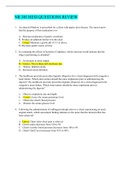
NR 305 HESI QUESTIONS REVIEW
NR 305 HESI QUESTIONS REVIEW 1. An antacid (Maalox) is prescribed for a client with peptic ulcer disease. The nurse knows that the purpose of this medication is to A. Decrease production of gastric secretions. B. Produce an adherent barrier over the ulcer. C. Correct Maintain a gastric pH of 3.5 or above. D. Decrease gastric motor activity. 2. In evaluating the effects of lactulose (Cephulac), which outcome would indicate that the drug is performing as intended? A. An incre...
- Exam (elaborations)
- • 12 pages •
NR 305 HESI QUESTIONS REVIEW 1. An antacid (Maalox) is prescribed for a client with peptic ulcer disease. The nurse knows that the purpose of this medication is to A. Decrease production of gastric secretions. B. Produce an adherent barrier over the ulcer. C. Correct Maintain a gastric pH of 3.5 or above. D. Decrease gastric motor activity. 2. In evaluating the effects of lactulose (Cephulac), which outcome would indicate that the drug is performing as intended? A. An incre...
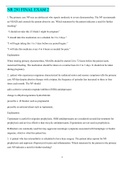
NR 291 FINAL EXAM 2
NR 291 FINAL EXAM 2 1.The primary care NP sees an adolescent who reports moderate to severe dysmenorrhea. The NP recommends an NSAID and counsels the patient about its use. Which statement by the patient indicates a need for further teaching? “I should not take this if I think I might be pregnant.” “I should take this medication on a schedule for 2 to 3 days.” “I will begin taking this 1 to 3 days before my period begins.” “I will take this medicine every 4 to 6 hours as n...
- Exam (elaborations)
- • 10 pages •
NR 291 FINAL EXAM 2 1.The primary care NP sees an adolescent who reports moderate to severe dysmenorrhea. The NP recommends an NSAID and counsels the patient about its use. Which statement by the patient indicates a need for further teaching? “I should not take this if I think I might be pregnant.” “I should take this medication on a schedule for 2 to 3 days.” “I will begin taking this 1 to 3 days before my period begins.” “I will take this medicine every 4 to 6 hours as n...
